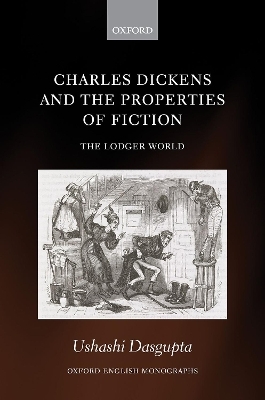
Charles Dickens and the Properties of Fiction
The Lodger World
Seiten
2020
Oxford University Press (Verlag)
978-0-19-885911-6 (ISBN)
Oxford University Press (Verlag)
978-0-19-885911-6 (ISBN)
This book explores the significance of tenancy in Charles Dickens's fiction. Dickens's conception of domesticity was nuanced, and through his works he describes the chaos and unxpected harmony to be found in rented spaces.
When Dickens was nineteen years old, he wrote a poem for Maria Beadnell, the young woman he wished to marry. The poem imagined Maria as a welcoming landlady offering lodgings to let. Almost forty years later, Dickens died, leaving his final novel unfinished - in its last scene, another landlady sets breakfast down for her enigmatic lodger. These kinds of characters are everywhere in Dickens's writing. Charles Dickens and the Properties of Fiction: The Lodger World explores the significance of tenancy in his fiction.
In nineteenth century Britain the vast majority of people rented, rather than owned, their homes. Instead of keeping to themselves, they shared space - renting, lodging, taking lodgers in, or simply living side-by-side in a crowded modern city. Charles Dickens explored both the chaos and the unexpected harmony to be found in rented spaces, the loneliness and sociability, the interactions between cohabitants, the complex gender dynamics at play, and the relationship between space and money. Charles Dickens and the Properties of Fiction demonstrates that a cosy, secluded home life was beyond the reach of most Victorian Londoners, and considers Dickens's nuanced conception of domesticity. Tenancy maintained an enduring hold upon his imagination, giving him new stories to tell and offering him a set of models to think about authorship. He celebrated the fact that unassuming houses brim with narrative potential: comedies, romances, and detective plots take place behind their doors. Charles Dickens and the Properties of Fiction: The Lodger World wedges these doors open.
When Dickens was nineteen years old, he wrote a poem for Maria Beadnell, the young woman he wished to marry. The poem imagined Maria as a welcoming landlady offering lodgings to let. Almost forty years later, Dickens died, leaving his final novel unfinished - in its last scene, another landlady sets breakfast down for her enigmatic lodger. These kinds of characters are everywhere in Dickens's writing. Charles Dickens and the Properties of Fiction: The Lodger World explores the significance of tenancy in his fiction.
In nineteenth century Britain the vast majority of people rented, rather than owned, their homes. Instead of keeping to themselves, they shared space - renting, lodging, taking lodgers in, or simply living side-by-side in a crowded modern city. Charles Dickens explored both the chaos and the unexpected harmony to be found in rented spaces, the loneliness and sociability, the interactions between cohabitants, the complex gender dynamics at play, and the relationship between space and money. Charles Dickens and the Properties of Fiction demonstrates that a cosy, secluded home life was beyond the reach of most Victorian Londoners, and considers Dickens's nuanced conception of domesticity. Tenancy maintained an enduring hold upon his imagination, giving him new stories to tell and offering him a set of models to think about authorship. He celebrated the fact that unassuming houses brim with narrative potential: comedies, romances, and detective plots take place behind their doors. Charles Dickens and the Properties of Fiction: The Lodger World wedges these doors open.
Ushashi Dasgupta is Associate Professor of English at the University of Oxford and Jonathan and Julia Aisbitt Fellow of English at Pembroke College.
1: Building a Career: From Sketches to Dombey
2: 'To Let To Let To Let': The Bildungsroman and the Spatial Imagination
3: 'The Property of 1851': The Great Exhibition and the Business of Hospitality
Interlude: Londoners Maritimized
4: 'Is This An Hotel? Are There Thieves in the House?': The Spatial Contexts of Crime
5: How to Live Together: Collaborative Fiction
Coda: Taking Leave
| Erscheinungsdatum | 03.01.2020 |
|---|---|
| Reihe/Serie | Oxford English Monographs |
| Verlagsort | Oxford |
| Sprache | englisch |
| Maße | 163 x 240 mm |
| Gewicht | 672 g |
| Themenwelt | Geisteswissenschaften ► Sprach- / Literaturwissenschaft ► Anglistik / Amerikanistik |
| Geisteswissenschaften ► Sprach- / Literaturwissenschaft ► Literaturgeschichte | |
| Geisteswissenschaften ► Sprach- / Literaturwissenschaft ► Literaturwissenschaft | |
| ISBN-10 | 0-19-885911-2 / 0198859112 |
| ISBN-13 | 978-0-19-885911-6 / 9780198859116 |
| Zustand | Neuware |
| Haben Sie eine Frage zum Produkt? |
Mehr entdecken
aus dem Bereich
aus dem Bereich
Poetik eines sozialen Urteils
Buch | Hardcover (2023)
De Gruyter (Verlag)
59,95 €
Buch | Softcover (2024)
belleville (Verlag)
20,00 €


